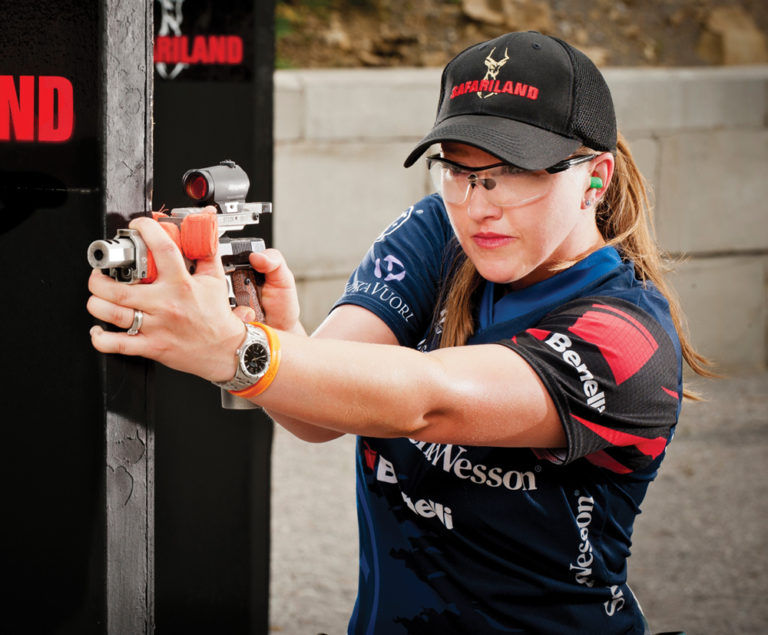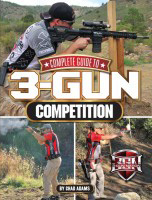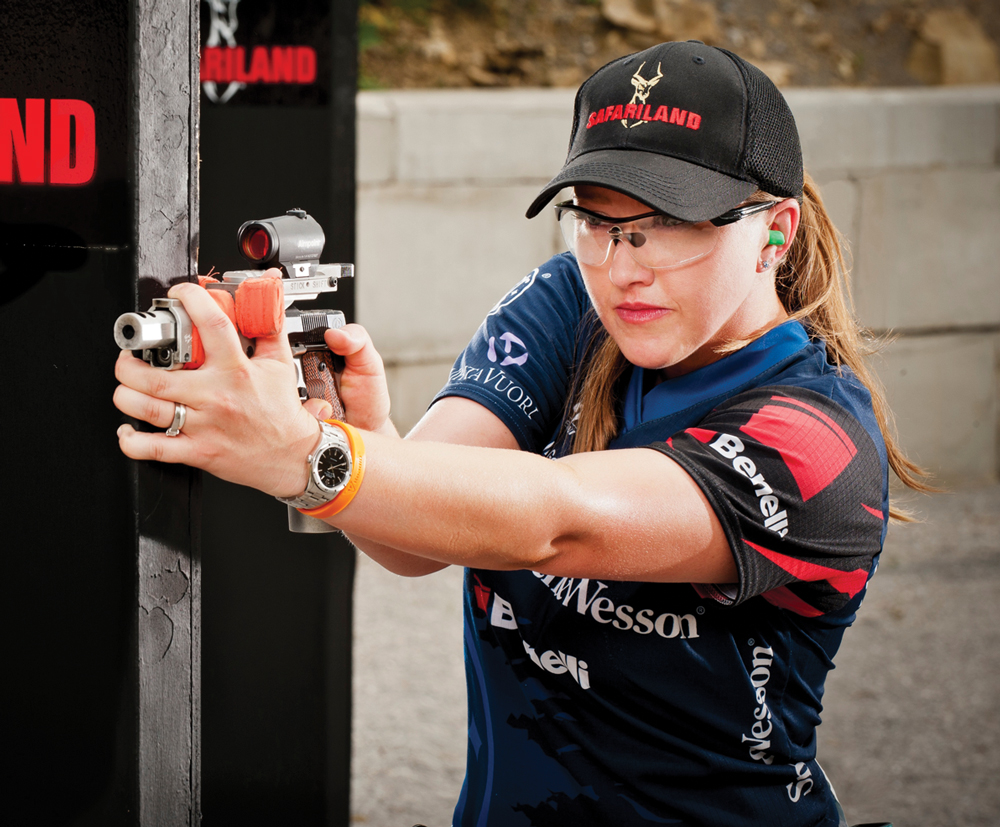
In the world of competitive shooting there are few people—men or women—who can match what Julie Goloski Golob has accomplished in the last two decades. Though she’s just 35, Golob has already won more than 120 championship titles in seven different action shooting disciplines. Her wins include 13 Ladies National Champion titles with the U.S. Practical Shooting Association (USPSA), three times NRA Bianchi Cup Ladies Open Champion and two Ladies Division International Revolver Championship wins. She’s an avid hunter who currently serves as captain of Team Smith & Wesson and is a member of Team Benelli 3-Gun. She’s also a wife and mother of one, with another child due soon. You got it—Golob is one busy young woman.
Over the course of a year, what does your calendar look like?
I shoot between 10 and 15 matches a year. Plus, I attend a number of special events and do some seminars and speaking engagements. If I’m asked to do television, that goes in there somewhere. When I’m preparing for a match, I’m at the range every day working on some skill set to make me better. I like to hunt, too, and I’m a pro-staffer for Prios Hunting Apparel.
Plus, you’re a mother and wife, a writer and a businesswoman?
It’s a big challenge. And it’s hard being away from home so much. Another difficult part is juggling all the opportunities. I’m asked to do a lot of speaking gigs and special events, things I’d love to do. But they conflict with a match or I just don’t have the time. Or, you’re going to, but you get the call and a child’s at home sick. If I was single, I could literally be on the road every day of the year.
So your main job is Captain of Team Smith & Wesson. What does that entail?
First and foremost, it’s to train for and compete in shooting matches, and to be a spokesperson for Smith & Wesson, at competitions and other events. I do some television and shooting demonstrations to promote the company, too. It’s a very broad job description.
How did you become a shooter?
My father was (and still is) a hunter and a competitive shooter. I basically grew up as “Daddy’s Girl,” and followed him around whenever he was at the shooting range. We used to work some of our range’s shooting events together as a father-daughter team. So, really, I grew up around it. By the time I was 14, I was big enough, and experienced enough, that I started competing in local matches.
What was your first firearm?
It was a Remington 870, 20-gauge. That's what I shot my first deer with growing up. Dad’s still got it at home.
You went from high school right to the U.S. Army Marksmanship Unit (USAMU)?
I was competing through high school, a lot of run-and-gun kind of matches and events. I went to my first national championship match in 1994, the USPSA Nationals in Barry, Ill., and the Army recruited me there. I joined right out of high school in 1995, and was assigned to the USAMU. They were expanding the Army Action Shooting program at the time, and they were looking for women to be a part of it. There weren’t a lot of young female shooters at the time, so I think I kind of stood out.
What did your eight years with the USAMU do for you?
Oh, my goodness, that’s the foundation I rely on today, all the things I learned at USAMU! When you’re a member of the USAMU, your “job” is to compete and win. And you have such tremendous resources there to help you compete. Some years, I shot 50,000 to 60,000 rounds practicing. There’s a lot of discipline there, too. Resources plus guidance. In some cases, forced guidance!
Was it always your plan to be a professional shooter?
Not really. Being around shooting growing up, and getting to know professionals like Rob Leatham and Doug Koenig, I guess it was always in the back of my mind. Like, Wouldn’t that be cool? But it wasn’t a plan.
How did you end up on Team Smith & Wesson?
After I got out of the Army, I worked for the Glock Shooting Sports Foundation for a few years, in an administrative position. But I was still shooting competitively. I went to the Smith & Wesson IDPA (International Defensive Pistol Association) Indoor National Championship in 2006. There, I had a chance to shoot the M&P handgun, and I was pretty impressed with it.
A lot of the top people from Smith & Wesson were there, too, and we started talking. By the end of the event, they made me one of those offers I just could not refuse. It’s pretty much my dream job. I get to represent a great company, shoot some of the top firearms in the world, and work with some of the best people I know. And I get paid for it!
Any advice for a young person who wants a career as a pro shooter?
What you have to have is a dream and goals and be willing to work hard. If you really want it, you can make a career out of the shooting sports. You can be a part of this great industry. It’s going to take some work and a willingness to stick it out when things get hard. But you can make it happen. But in today’s society, with this focus on instant gratification, instant everything; hard work and the need for it is probably the hardest thing for kids to understand.
The Second Amendment has been under attack of late. Your thoughts?
I don’t speak for anyone but myself on this issue. But as a professional shooter, I think it’s absolutely essential that my fellow shooters and I be responsible role models as gun owners and people who use guns. There are so many negatives out there in the media about the Second Amendment, guns and gun owners. We have to focus on the positives. The shooters I know, professionals or others, are amazingly kind and generous people. And the shooting sports have very positive influences on peoples’ lives. That message needs to get out as much as possible. I think that people like myself, who work in this industry, have a responsibility to promote these positives, and to give them a face and a voice.
This article appeared in the May 6, 2013 issue of Gun Digest the Magazine.
 Want to learn more about competitions? Check out the Complete Guide to 3-Gun Competition.
Want to learn more about competitions? Check out the Complete Guide to 3-Gun Competition.


![Best Concealed Carry Guns In 2025 [Field Tested] Wilson Combat EDC X9S 1](https://gundigest.com/wp-content/uploads/Wilson-Combat-EDC-X9S-1-324x160.jpg)


![Best 9mm Carbine: Affordable PCCs [Tested] Ruger Carbine Shooting](https://gundigest.com/wp-content/uploads/Ruger-Carbine-Shooting-100x70.jpg)
![Best AR-15: Top Options Available Today [Field Tested] Harrington and Richardson PSA XM177E2 feature](https://gundigest.com/wp-content/uploads/Harrington-and-Richardson-PSA-XM177E2-feature-100x70.jpg)
